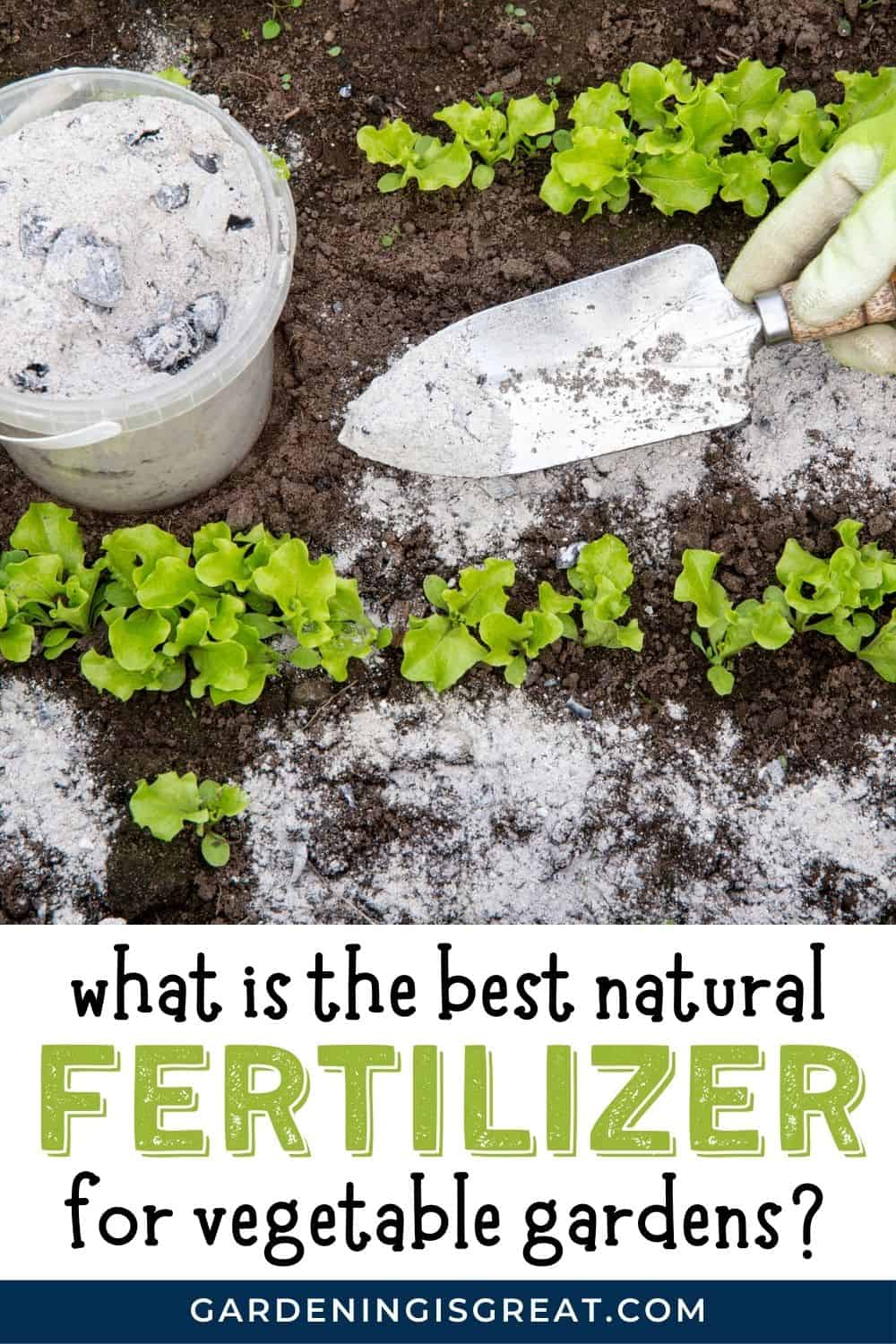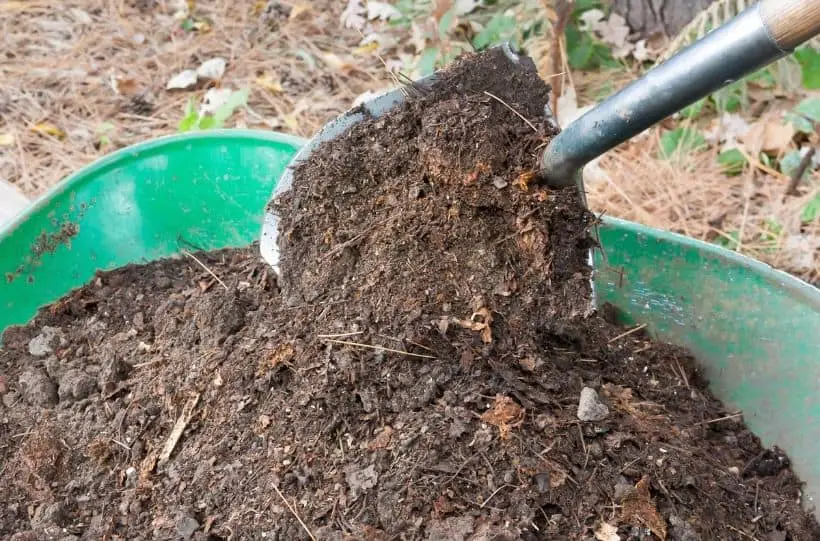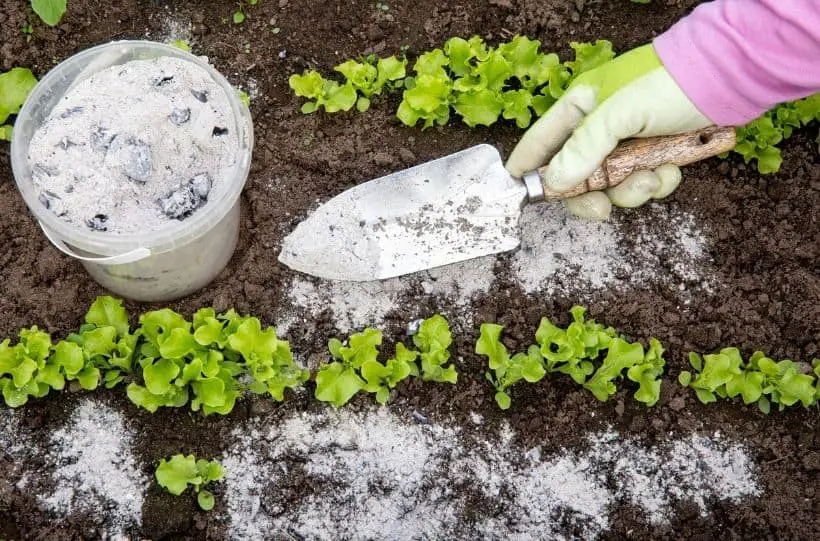What Is The Best Natural Fertilizer For Vegetable Gardens?
One of the great benefits of having a vegetable garden is harvesting fresh organic produce. The soil needs in that area need to be fertilized regularly to ensure that it remains rich, but it can be confusing knowing which soil amendments to choose.
Let’s go through some organic fertilizer options to keep your vegetable garden sustainably healthy, the way nature intended.
The best natural fertilizer for vegetable gardens is compost. Compost is a rich mixture of decomposed organic material that improves soil quality. It is rich in nutrients and organisms that will nourish vegetables. Compost is easy to make and an excellent way to recycle food and garden waste.

This post contains affiliate links that earn me a commission at no additional cost to you.
Nature has provided more than enough natural ingredients to create dense, dark, lush compost that will feed your growing vegetables. The very best part is that there is no prescribed recipe for compost, so once you know the basics of what to add, you can have a steady supply of black gold for your soil.
What Is The Best Natural Fertilizer For Vegetable Gardens?
The difference between a vegetable garden and the rest of the yard is that you will be eating the end product. That makes only using organic elements to nourish the plants more important.
Compost ticks all the boxes when it comes to an all-natural vegetable garden fertilizer. It is hassle-free, inexpensive, organic, and provides a lush source of recycled goodness.

Many organic additives can be added to soil that will be beneficial. The recipes for various natural fertilizer teas, meals, and emulsions are extensive, and each one has benefits. However, two areas are often lacking if choosing one specific organic additive: continuity and balance.
Continuity: It is unlikely that you would be able to (or want to!) have a fish emulsion fertilizer brewing anywhere in your yard for very long. When done correctly, composting eliminates odor and produces a thick, rich fertilizer additive that can never burn plants or be overused. Since there will be a steady supply, you will be able to add compost to your vegetable garden regularly.
Balance: Applying a specific fertilizer, even if it is organic, can often supply high amounts of a particular element but be lacking in another. For example, blood meal is an excellent source of nitrogen when mixed with water and sprayed on as a fertilizer, but that’s all it is, and nitrogen may not be an element that your veggie garden lacks.
It is possible to purchase natural compost for your vegetable garden, but making your own is easy. Composting is a great method to recycle organic waste from the kitchen and yard, saving you money on having to buy a lot of special fertilizer ingredients.
Compost can be applied as a solid, nutrient-laden, moisture-holding solid mixture or in a liquid form called compost tea.
One note of caution when creating your own natural compost to use as fertilizer – avoid adding anything that contains pesticides or toxic chemicals. For example, while lawn clippings are usually excellent for composting, they must never be added if they have been sprayed with a weed killer or insecticide.
Common Natural Fertilizers
There are plenty of natural ingredients available that can be used to give your vegetable garden a boost. Compost is an excellent combination of a variety of organic elements which have aged to render them safe and nutrient-rich.
However, loads of other natural substances can be used as fertilizer to feed vegetable patches or can be added to the compost to make it even more effective.
There are even natural fertilizer recipes that mix and match various ingredients that will give your veggies a quick boost of a specific element they need. But before you go dousing your tomato plants in fresh chicken manure to provide them with nitrogen, remember that even though an ingredient is natural, it may need to be modified or aged before it can be used safely.
Let’s go through a list of common all-organic fertilizers that you can use confidently in your vegetable garden.
| Natural Fertilizer | Main Element | Note |
| Compost | Loaded with nutrients and microorganisms | It will benefit all vegetables and add healthy texture to the soil |
| Farm Animal Manure (do not use pet manure) | Nitrogen, especially in chicken manure. | All manure, besides rabbit, should be aged before applying. Raw chicken manure can burn plants, and fresh horse manure may contain weed seeds. |
| Fish tank water | Nitrogen – A fantastic natural source of ready-to-use plant fertilizer | A brilliant, all-around fertilizer that will benefit most plants |
| Fish emulsion (A liquid fertilizer made by seeping fish parts) | Nitrogen | Adds a concentrated dose of nitrogen to the soil. Only apply to the ground and not directly to the plants. |
| Bone Meal | Phosphorus | Assists plants in developing healthy root systems |
| Worm Castings (sold as organic manure) | Variety of nutrients | An excellent overall fertilizer that will enrich the soil. |
| Blood Meal | Nitrogen | It can be sprayed on if added to water or remain dry and added as a powder |
| Wood Ash (not from briquettes. Only use ash from natural wood) | Potassium and calcium carbonate | Great to balance out pH in acidic soil and adds trace elements but should be used sparingly. |
| Eggshells (dry and mash them into powder) | Calcium carbonate | Use instead of lime in the garden. |
| Coffee Grounds (dry them out before using) | Nitrogen, magnesium, and potassium | Adds acidity, which is great for veggies like celery, peppers, and pumpkin. |
When creating natural fertilizers for a vegetable garden, don’t forget the water. Some tap water contains harmful chemicals. In areas with hard water, softeners may have been added, which are not ideal to use to water plants.
The solution is to water using rainwater whenever possible. However, this is not always practical, so aim to enrich your vegetable garden soil to keep as much moisture in the soil, and you won’t have to water as often.
Adding a layer of natural mulch, like compost, to the surface of your vegetable garden soil will help to limit evaporation from your garden while at the same time delivering a healthy dose of nutrients to the roots below each time you water.
How To Make Compost For A Vegetable Garden
Compost is by far the best natural fertilizer and soil amendment that can be safely added to enrich the soil. It is easy to make, and once you start composting, you will wonder why you haven’t been doing it all along!

To successfully create glorious, rich, dark, healthy compost, you only need four things:
- 50% Brown material – anything that is organic and dry. This can include straw, dry lawn clippings, autumn leaves, or even wood shavings. You can also use newspaper as the inks used in modern newspapers is 100% non-toxic and will break down during the composting process.
- 50% Green material – Fresh green grass, kitchen scraps, green plant trimmings, coffee grounds, or farm animal manure. This portion of the compost can quickly add up if you keep a collection bin in the kitchen, as it includes all vegetable peels and other organic waste.
- Moisture – A healthy compost pile needs enough water, but it must never be soaked. Too much moisture can kill the microbes responsible for breaking down the material into nutritious compost.
- Oxygen – Compost makers often forget this one, but it is vital. Creating compost is about encouraging the activity of living microorganisms, and they need an ample supply of food, moisture, and oxygen to break down the pile quickly. Simply throwing more and more of the correct materials onto a pile will eventually give you compost. However, if you want the process to move along vigorously, so you have a useable product as soon as possible, turn the compost regularly to add oxygen.
You can create a compost pile in a sunny spot if you have a large enough yard. However, if you have more limited space or prefer the convenience of a more compact system, there are many fabulous composting systems available. These can be conveniently located and will not create any odor or attract critters which can happen with an open compost pile.
Instead of spending money on continuously buying fertilizers for your vegetable garden, a once-off investment in a nifty outdoor composting bin will provide you with a lifetime supply of nutrient-rich fertilizer. If you have a vegetable garden, composting is ideal for creating natural fertilizer that is rich, safe, and nourishing for your produce.
What Ingredients Must Not Be Added To Compost?
Compost bins are an excellent method to create nutrient-packed natural fertilizer to use in any area of the garden. Many people keep a composting bin in the kitchen to add food scraps to transfer to the composting area.
While most perishable household food will be welcomed by the compost creating microbes at work transforming waste into a valuable soil supplement, some ingredients should never be included.
Although most harmful elements will be destroyed during the composting process because the decomposition process generates considerable heat, it is better to err on the side of caution and avoid some items entirely.
- Meat – Although meat is natural and will decompose, the process is a bit different from composting plant matter. For one, it may smell, which could attract pests like flies. Secondly, raw meat could harbor pathogens like E.coli or salmonella.
- Dairy – Besides possibly creating a putrid smell, dairy products tend to coat other materials that are being composted. This will slow down the composting process.
- Oils and fat – Renders whatever material around them waterproof, so the composting process will take longer.
- Diseased plants and invasive weeds – Most harmful elements will be destroyed if your compost pile is working perfectly and heating up to around 140F. However, it’s not worth taking the risk and having some nasties popping up unexpectedly in your vegetable garden, so don’t include anything you want eliminated from the property.
- Any plants treated with weed killer or pesticides – Lawn cuttings are excellent additives for any compost pile, but not if the lawn has been sprayed with anything that could interfere with or kill the microbes responsible for breaking down organic matter in your compost.
- Cat or dog waste – The manure from herbivorous farm animals like sheep, goats, horses, or even rabbits will give your compost a boost. However, never add any waste from dogs or cats. Parasites like roundworms and bacteria, including E.coli, may persist in compost that includes pet waste, so avoid it entirely for compost you intend to use on a vegetable patch.
Differences Between Natural and Synthetic Fertilizers
The term ‘natural’ is used a lot, but it can be confusing when it comes to something like garden fertilizer. Since growing vegetables feels like a natural, earthy process, it may feel like anything we can add to make them thrive must be healthy. However, there is a vast difference between natural and synthetic fertilizers.
Let’s take a quick look at the main differences between natural and synthetic fertilizers.
| Natural Fertilizer | Synthetic Fertilizer |
| Origin is living organisms or the earth | Composed of synthesized nitrogen, phosphorus, and potassium (N-P-K) |
| Can be plant or animal-derived | Contain concentrated amounts of N-P-K compared to organic fertilizer |
| Adds a variety of organic materials to soil | Usually adds very specific nutrients |
| Improves overall health and texture of soil | It does not improve long-term soil health |
| Nutrients are usually released slowly | Fast release of nutrients |
| Organic fertilizer like compost adds to soil health | A buildup of specific fertilizer can create soil imbalances over time |
It all boils down to sustainability and overall soil health. Synthetic fertilizer, if administered in the right amount, will give a vegetable garden a quick energy boost, but providing a continuous stream of rich organic matter will ensure the long-term good health of the plants. Using natural fertilizers like compost will enrich the soil and radically improve its texture.
Learn more about natural fertilizers
- https://www.theprairiehomestead.com/2021/07/the-best-organic-fertilizers-for-your-vegetable-garden.html
- https://www.extension.uidaho.edu/publishing/pdf/cis/cis1016.pdf
- https://www.chicagobotanic.org/plantinfo/synthetic_vs_natural_fertilizer

Few things taste better than freshly harvested natural produce from your own backyard. Ensuring that the plants receive enough nutrients can be tricky if you want to stick to organic fertilizer options.
Fortunately, Mother Nature has provided more than enough ingredients to provide plants with everything they need to thrive. The best natural fertilizer for your vegetable garden is compost.
It is easy to make yourself and combines everything nature has to offer in a single, rich, dark mixture that enriches the soil. Happy composting!
And for more information about caring for your vegetable garden, check out these next:
